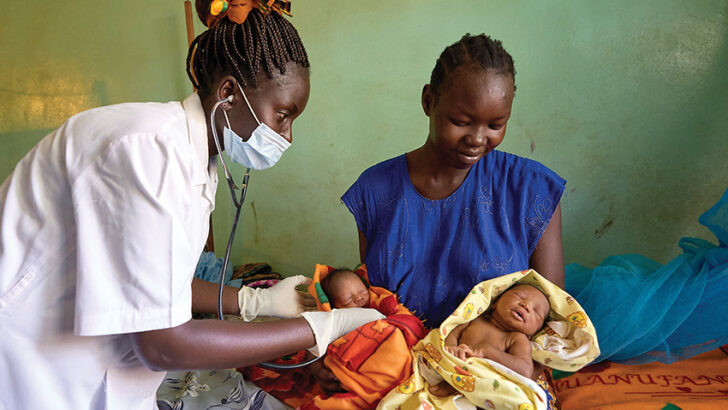Missionary support to developing communities is very important, Sr Josephine McCarthy tells Ruadhán Jones
Whether it be in health, education or sustainable farming, the support offered by missionaries is fundamentally important to developing communities, says Sr Josephine McCarthy PBVM
“Missionaries are extremely well placed to know what’s needed on the ground because they’re there among the people, some of their members are local young men and women,” says Sr McCarthy, who spent many years on mission in Africa.
That’s why legacy donations to Misean Cara, a non-profit organisation that works directly with missionaries, is “money well spent”, she continues.
“Every single penny of the donation goes to the actual people that the missionaries are serving,” says the Irish nun, who serves on the board of Misean Cara. “It’s invested in projects on the ground.”
Nurturing
Missionaries are of course involved in nurturing Catholic communities, “but all the development work they do is non-denominational”, she adds. “They work with everyone.”
Missionaries are involved in a variety of projects in health, education and sustainable development, to name but a few. In each area, their goal is to develop local leadership and self-sustaining local communities.
“The modern theory of development is that we should be supporting local autonomy and local leadership and missionaries are ideally placed to support local initiatives to nurture and develop those local leaders,” Sr McCarthy explains.
“Handouts are very temporary, but if you develop local leadership and you develop self-sustaining local communities, then that’s much more long term then handing out some funding in a short term way”.
In terms of sustainable farming, for instance, many communities have native practices and know-how, but they need support to develop them.
“The mantra of missionaries has always been to work themselves out of a job – in other words to build up schools that would be self-sustainable that people can take over,” says Sr McCarthy.
Education is a key area on which missionaries focus, as “everybody, no matter where you are in the world, knows that education is the door out of poverty,” Sr McCarthy asserts.
“For instance, one of our sisters in Zambia would have started a school with a small number of students under a palm tree. Now it’s a huge school with a thousand students and the government are paying salaries.
“That’s the kind of progression you want to see, sustainable progression going forward.”
What makes missionaries so fundamental to the development of developing communities is that they are there long term, Sr McCarthy explains.
“I worked in Peru and in Ecuador – you’re there among the people. When people are talking about those I lived with, I say that if they had no water then I had no water either,” she says.
“You’re there, you’re sharing their problems, you’re not doing for people and you’re not taking a lead. But you’re there standing with people while they find their voices and advocate for housing, education and that way you build up local leadership.”
As someone who worked on the ground for 20 years and who is now back in Ireland, to see the wonderful work that missionaries do is incredible, Sr McCarthy continues.
Incredible
“It is incredible the work they do with a small amount of money. That’s what blows my mind. While they may get money for one project, then they are able to support that project with volunteers – missionaries all work on a voluntary basis… They can ensure it’s followed up, that it’s not short term. Missionaries are on the ground, able to see that it’s continued if you like. Sometimes there’s short term funding for something, but if you get a legacy, you can continue that project.”
What makes legacy donations so important to this vital work is that, unlike other kinds of funding, it’s not tied to a particular type of project.
“Some funding is tied to a particular project,” Sr McCarthy says. “But you see a need that is immediate, for instance the flooding in Pakistan recently and thousands of people lost their houses, several of the missionary groups were able to jump in immediately with housing, with people to get alternative accommodation to help kids get to school. Those kinds of areas where they’re able to jump in immediately and help people.”
For more information, visit https://www.miseancara.ie/


 Ruadhán Jones
Ruadhán Jones At the St Daniel Comboni Hospital in Wau, South Sudan, midwife Roseline Edwards Anthony examines the newborn sons of mother Alek Kual. Roseline is a graduate of the Catholic Health Training Institute (CHTI), run by Solidarity with South Sudan in partnership with the Faithful Companions of Jesus, who receive funding for the project through Misean Cara. Photo: Paul Jeffrey
At the St Daniel Comboni Hospital in Wau, South Sudan, midwife Roseline Edwards Anthony examines the newborn sons of mother Alek Kual. Roseline is a graduate of the Catholic Health Training Institute (CHTI), run by Solidarity with South Sudan in partnership with the Faithful Companions of Jesus, who receive funding for the project through Misean Cara. Photo: Paul Jeffrey 